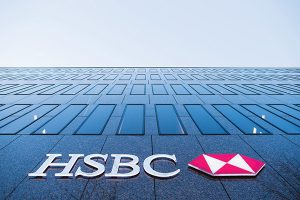East-West relations are a growing problem for HSBC Holdings Plc, the bank with feet planted equally in each hemisphere.
U.S.-China tensions have steadily ramped up in recent years. But while geopolitical discord threatens HSBC’s business, splitting the bank into a version of HSBC East and HSBC West — as its largest shareholder, Shenzhen-based Ping An Insurance (Group) Co, has proposed — is no solution. It would only add costs
or destroy revenue. In fact, HSBC had answered the break-up question before Ping An raised it, by revealing more detail about how much of its Asian revenue comes from western clients. Many of them would be less able or willing to work with a standalone HSBC East.
Ping An and other shareholders are frustrated with the bank’s valuation and lagging stock price, especially in the past couple of years. It used to trade at a premium to most European peers and to its forecast book value. Now it trades at a 30% discount to book value, although it remains at a premium to its peers.
But look at how HSBC traded in recent years, and you can see quickly that its shares are governed more by economics and interest rates than by politics. The shares’ valuation rose strongly in 2017 and 2018 when President Donald Trump was ramping up the trade-war rhetoric, but US rates were heading higher.
They fell during 2015-2016 when Chinese growth and financial markets were under pressure; again in
the second half of 2019 when fears grew of a
global slowdown and US interest rates were being cut; and, most painfully, since the Covid-19 pandemic brought global trade to a sudden halt.
HSBC has been caught in some heavy geopolitical crossfire, hurting its reputation in both hemispheres – over its stance on Hong Kong’s draconian security laws, or its apparent role in the 2018 arrest of the chief financial officer of China’s Huawei Technologies Co in Canada, for example. For sure, if the schism gets worse between western nations and China, HSBC is likely to suffer. For now, it hasn’t apparently led customers to rethink their banking arrangement.
The way to think about HSBC is in three main blocks: A UK retail bank that has a strong position in British current accounts and mortgages; a Hong Kong retail and commercial bank that dominates its home market and is the gateway to China; and lastly a global, trade-led corporate and investment bank.
The UK and Hong Kong retail banks are separate entities with little overlap or relevance to each other, so the question is whether the global business could live without one or the other. The Hong Kong and Asia businesses are often held up as producing stronger profits and higher returns than the rest of HSBC. That is partly an illusion.
—Bloomberg
 The Gulf Time Newspaper One of the finest business newspapers in the UAE brought to you by our professional writers and editors.
The Gulf Time Newspaper One of the finest business newspapers in the UAE brought to you by our professional writers and editors.
